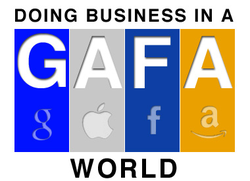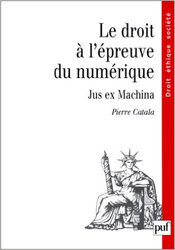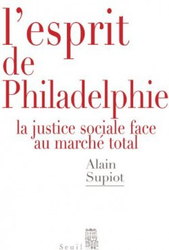Sectors
Dec. 3, 2014
Breaking news

Available in several languages, the document is titled: Dynamic telecoms market requires modern legal bases.
The consultation document intends to proceed with a progressive review". A first step of review will take place late 2015.
Operators have already protested about the narrowness of the consultation, in particular because the issue of optical fiber is not asked!footnote-5.
Dec. 2, 2014
Breaking news

Internet requires regulation. It does not works solely because of the moral sense of the users or through vigilance of companies that develop on it.
The regulator of the virtual space can be imagined, or a regulator of the various possible activities that develop there, regulators then deploying their powers as when the activity takes place on the Internet. Thus, it is the case of advertising.
In the UK, the Advertising Standard Authority (ASA) monitors the advertising business, also on the Internet.
Its decision of 26 November 2014 is remarkable for several reasons. It punishes two non-professionals, namely two users Youtube tool. But in communication, non-market entrepreneurs sometimes have more weight than businesses. But on the Internet, users can sponsor their free activity, which is to monetize. In this case, the two had played on their Youtube channel short films that were advertisements.
The complaint made against them is that Youtube is not a support on which those who put content make it to commercial purposes. And other users could not understand they watched the advertisement and not a distraction film or information.
The Regulator imposes a sanction against Internet users not because they did a promotional contract with the company, in this case Cadbury wich wants to promote Oreo cookies. By this contract, the entreprisee via the famous Internet users can reach consumers, which is permissible. They are punished because they have deceived the confidence of the other Internet users who can't imagine being the target of an advertisement. The fact that it is people with many fans on youtube counted in the severity of the Regulator. Indeed, they have more than 2 million subscribers. More than 1.3 million have seen the offending video. Only 243 people have not loved it.
Dec. 1, 2014
Breaking news

However, France and Germany have asked 27 November 2014 to the European Commission to take steps against those who hold the platforms on the Internet, including search engines. Everyone knows that this is the famous "GAFA" (Google, Apple, Facebook and Amazon).
It seems that the EU institutions fit, since the European Parliament voted on November 27 a text saying that it could ban these companies to monetize their platform activities themselves.
By their regulatory perspectives, Europe gets "retrograde" against the US dynamism?
At first glance, one might say. But it may be that these companies have become "critical", they take the heart of the digital economy, or even the knowledge economy and social cohesion. In such cases, the regulation of these objective phenomena justifies intervene directly in companies in which the social group comes to identify itself. If the company comes to stifle others, it is not that it stifles competition only, but innovation and free expression.
Then pass the mere vigilance competition law instruments of regulation, common in banking and financial law, such as transparency requirements.
This demonstrates Regulation and Supervision meet when companies become crucial.
Updated: Sept. 25, 2012 (Initial publication: Dec. 7, 2011)
Sectorial Analysis

Translated Summaries
In The Journal of Regulation the summaries’ translation are done by the Editors and not by the authors
ENGLISH
The Conseil d’Etat (French Council of State) handed down a ruling (n°339154) on October 19, 2011 in the French Data Network, Apple, and iTunes case. In this ruling, it refused to annul the decree giving the "Haute Autorité pour la diffusion des œuvres et la protection des droits sur Internet" (HADOPI — France’s Internet Piracy Regulator) the power to issue injunctions to force the accessibility of essential information on the Internet in order to guarantee interoperability, using either penalties or fines.
FRENCH
Le Conseil d’Etat a rendu un arrêt (n ° 339154) le 19 Octobre 2011 French Data Network, Apple et iTunes. Dans cet arrêt, il a refusé d’annuler le décret donnant à la Haute Autorité pour la diffusion des Œuvres et la protection des Droits sur Internet (HADOPI) le pouvoir d’émettre des injonctions pour forcer l’accessibilité des ’informations essentielles sur Internet afin de garantir l’interopérabilité, en utilisant des injonctions ou des amendes.
ITALIAN
Il “Conseil d’Etat” (il Consiglio di Stato francese) ha pronunciato una decisione (n° 339154) il 19 ottobre 2011 nel caso della rete di dati francese, Apple ed iTunes. In questa decisione, il Consiglio di stato ha rifiutato di annullare il decreto che conferisce alla “Haute Autorité pour la diffusion des œuvres et la protection des droits sur Internet” (HADOPI – l’autorità francese di regolazione contro la pirateria informatica) il potere di emettere delle sanzioni per assicurare l’accessibilità di informazioni essenziali su internet per garantire l’interoperabilità, usando così delle multe o delle ammende.
..................
Other translations forthcoming.
Updated: Sept. 25, 2012 (Initial publication: June 12, 2011)
Sectorial Analysis

ENGLISH
On May 12, 2011, both Neelie Kroes, the European Commissioner for the digital agenda within the European Commission, and Larry Strickling, Assistant Commissioner for Communications and Information within the United States Department of Commerce, sent a notification to the ICANN, a private association that manages Internet domain names. First of all, they agreed with the principle of self-regulation of Internet domain names by the ICANN. But, they requested a reform of its “governance” to improve its transparency and better take into account public authorities’ recommendations.
Association - Conflict resolution - Domain name - European commission - Internet - Internet Corporation for Assigned Names & Numbers (ICANN) - Memorandum - Power - Private regulator - Regulatory Authority - Self regulation - Soft law - Transparency - United Nations (UN) *
* In The Journal of Regulation, these keywords are done by the Editor and not by the Author.
PORTUGUESE
Informe bibliográfico (Internet): Autoridades europeias e norte-americanas notificaram a ICANN, uma associação privada encarregada da auto-regulação de nomes de domínio na Internet, que ela deve adotar uma governança mais transparente e também adotar as recomendações de estruturas públicas.
Em 12 de maio de 2011, tanto Neelie Kroes, o Comissário Europeu para a agenda digital dentro da Comissão Europeia, quanto Larry Strickling, Comissário Assistente para Comunicações e Informação dentro do Departamento de Comércio dos Estados Unidos da América, enviaram uma notificação para a ICANN, uma associação privada que gerencia nomes de domínio na internet. Em primeiro lugar, eles concordaram com o princípio da auto-regulação dos nomes de domínio na Internet pela ICANN. No entanto, eles solicitaram uma reforma em sua governança para melhorar sua transparência e melhor levar em consideração as recomendações de autoridades públicas.
Associação – Resolução de conflitos – Nome de domínio – Comissão Europeia – Internet - Internet Corporation for Assigned Names & Numbers (ICANN) – Memorandum – Poder – Regulação privada – Autoridade de regulação – Auto-regulação – Soft law – Transparência – Nações Unidas (ONU)*
* No Journal of Regulation, as palavras-chave são fornecidas pelo Diretor, e não pelo Autor.
ITALIAN
Relazione bibliografica (Internet): Le autorità europee e nord americane hanno indicato che l’ICANN, una società privata che ha lo scopo di auto-regolare i nomi a dominio di internet, dovrà aumentare la trasparenza della gestione ed adottare le raccomandazioni delle strutture pubbliche
Il 12 maggio 2011, Neelie Kroes, Commissario europeo per l’agenda digitale della Commissione europea, e Larry Strickling, Commissario assistente per le comunicazioni e l’informazione del Dipartimento del Commercio degli Stati Uniti, hanno entrambi dichiarato che l’ICANN, una società privata che gestisce i nomi a dominio di Internet, deve riformare il proprio sistema di gestione migliorando la sua trasparenza e deve prendere in debita considerazione le raccomandazioni provenienti dalle autorità pubbliche.
Associazione - Autorità di regolazione - Autorità privata di regolazione - Auto-regolazione - Commissione Europea - Internet - Internet Corporation for Assigned Names & Numbers (ICANN) - Memorandum - Nazioni Unite (ONU) - Nomi di dominio - Potere - Risoluzione di controversie - Soft law - Transparenza *
* In The Journal of Regulation, le parole chiave sono responsabilità dell’Editore e non dall’Autore.
Other translations fortcoming.
Updated: Sept. 25, 2012 (Initial publication: Sept. 9, 2010)
Sectorial Analysis

Le British Advertising Standards Authorithy (ASA — organisme britannique d'autorégulation de la publicité) a annoncé le 1er septembre 2010 une révision au Committee of Advertising Practice Code (The CAP Code — le Code des bonnes pratiques dans la publicité), afin de pouvoir répondre aux plaintes des consommateurs relatives aux publicités non-conformes sur les sites Internet britanniques, et de les sanctionner. Ces nouvelles règles entreront en vigueur le 1er mars 2011.
GERMAN
Die British Advertising Standards Authority (ASA - die britische Selbstregulierungsbehörde für die Werbebranche) hat am 1. September 2010 verkündigt, dass der Committee of Advertising Practice Code (the CAP Code - die Richtlinien für Qualitätsregeln in der Werbewirtschaft) so verändert wird, dass er für das Empfängnis und die Behandlung von Verbrauchersklagen gegen Internet-Werbungen zuständig wird. Diese Regel wird erst am 1. März 2011 im Kraft treten.
SPANISH
El British Advertising Standards Authority (la Autoridad británica de la autorregulación publicitaria) extiendo el CAP Code (el código des buenas prácticas publicitarias) para cubrir las publicidades que se encuentran en sitios de web británicos
El British Advertising Standards Authority (la Autoridad británica de la autorregulación publicitaria) anunció el 1 de septiembre 2010 una revisión al Committee of Advertising Practice Code (the CAP Code – el código des buenas prácticas publicitarias), para poder responder a las quejas y sanciones sobre las prácticas publicatarias no-conformes sobre los sitios de web británicos. Estas nuevas reglas entrarán en vigor el primero de marzo del 2011.
Updated: Sept. 25, 2012 (Initial publication: May 19, 2010)
Sectorial Analysis

Main information
The Federal Communications Commission (FCC) announces on May 6, 2010 that it will reclassify broadband Internet service as a Telecommunications Service, in order to overcome the ruling by the United States Court of Appeals for the District of Columbia on April 6, 2010, which found that the FCC’s approach to network neutrality lacked sufficient legal basis.
Updated: Sept. 25, 2012 (Initial publication: May 17, 2010)
Sectorial Analysis

Main information
A contract between Free (a French Internet Service Provider) and one of its subscribers contained a clause stipulating that access to audiovisual services was conditional upon the eligibility of the user’s telephone line for such services. The Court of Cassation deems that except in cases of force majeure, such a clause does not exempt the service provider from his strict liability to provide such services
Updated: Sept. 25, 2012 (Initial publication: May 6, 2010)
Sectorial Analysis

Main information
On April 27, 2010, the European Parliament’s Committee for Health voted to introduce an amendment to the European Commission’s ‘Pharmacovigilance and Prescription Medicine Package’, which would introduce a strict regime for online prescription medicine sellers.
Updated: Sept. 25, 2012 (Initial publication: April 13, 2010)
Sectorial Analysis

Main information
The United States Court of Appeals for the District of Columbia Circuit strikes down a decision that the Federal Communications Commission (FCC), the American telecommunications regulation agency, had taken against an Internet service provider, on the grounds that the FCC is incompetent to impose the theory of network neutrality on Internet service providers.
Updated: Sept. 25, 2012 (Initial publication: Feb. 11, 2010)
Sectorial Analysis

Main information
Definitive ratification of the 'three-strikes' riposte system concerning illegal downloading as part of the Hadopi II Act
Updated: Sept. 25, 2012 (Initial publication: Feb. 11, 2010)
Sectorial Analysis

Main information
Nomination of the members of the Haute autorité pour la diffusion d’oeuvres et la protection de droits sur Internet (Hadopi – High Authority for the Dissemination of Works and the Protection of Rights on the Internet).
Updated: March 8, 2012 (Initial publication: Nov. 8, 2011)
Thesaurus : Doctrine
May 27, 1998
Thesaurus : Doctrine

Complete reference : Catala, P., La propriété de l'information, in Le droit à l'épreuve du numérique. Jus ex Machina, coll. "Droit, Éthique, Société", PUF , Paris, 1998, p.245-262
Read the article (written in French).

